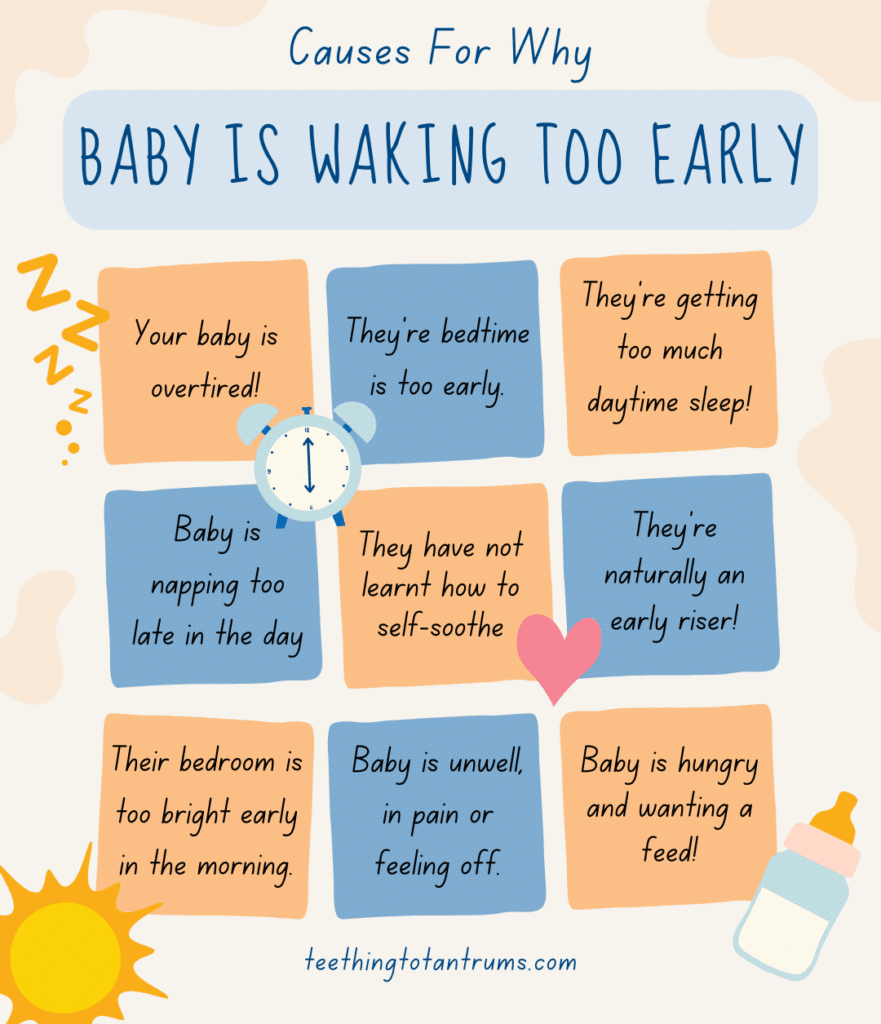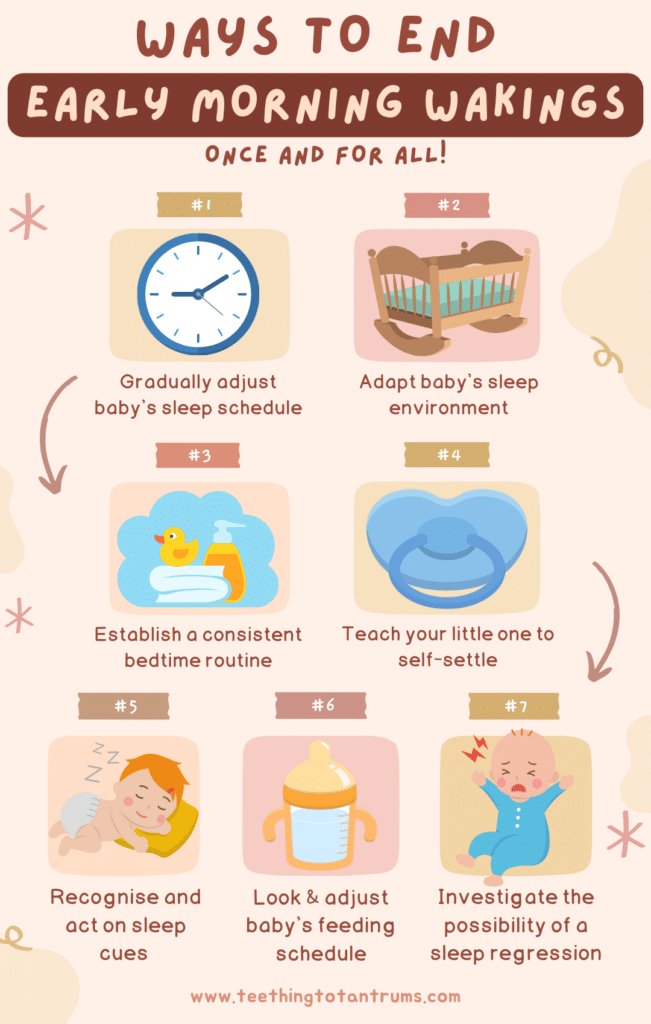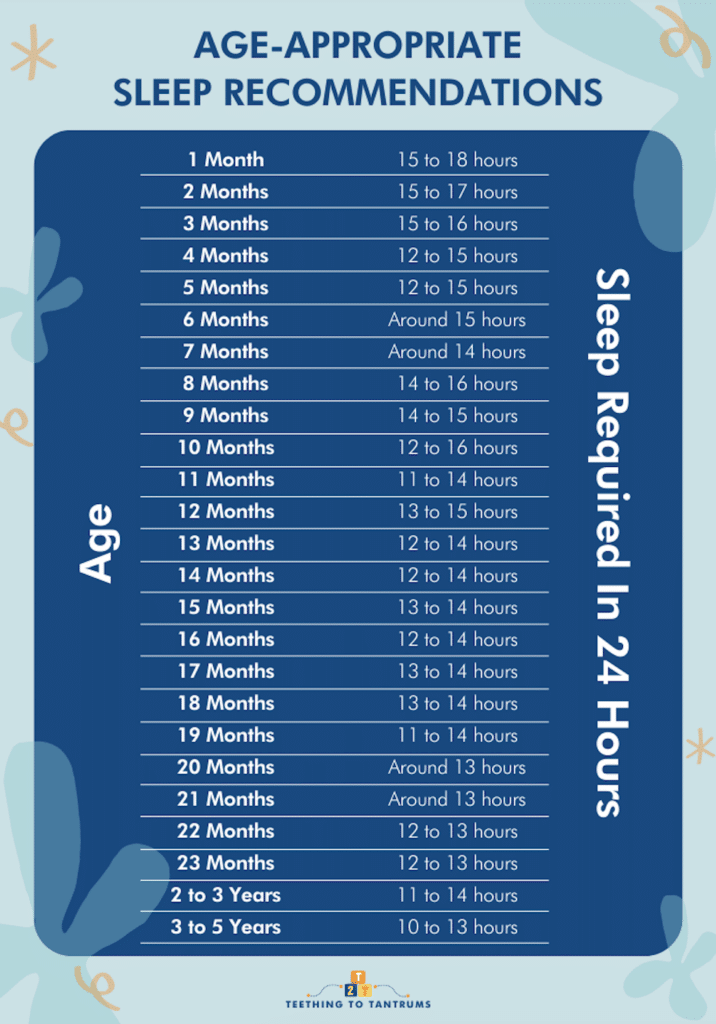Are you struggling with your baby waking too early? I know from experience how frustrating it can be when the family is not getting enough sleep, and it can be really tough to figure out what’s causing your baby to wake up very early.
Understanding the root cause of the problem is the first step in finding a solution. With a little patience and some helpful tips, you can help your baby get the restful sleep they need, and you can get some much-needed rest too!

Table of Contents
How To End Baby’s Early Morning Wake Ups
Common Causes Of Baby Waking Too Early
Here are some common reasons why your little one may be waking up early:

- Baby is overtired: I know this might sound strange but one of the most common reasons for early waking is overtiredness. If your baby is not getting enough sleep time during the day or is going to bed too late, they may wake up earlier than usual. Overtired babies struggle to stay asleep for long periods of time. To prevent this, make sure your baby is getting enough daytime sleep and going to bed at an age-appropriate time.
- Bedtime is too early: It is important to consider the age and developmental needs of your baby when setting a bedtime. While it may seem counterintuitive, an earlier bedtime can actually lead to more night waking and disrupted sleep. If your little one is consistently waking up too early in the morning hours, it may be time to adjust their bedtime to a slightly later time that aligns with their natural sleep patterns.
- too much daytime sleep: While napping is an important part of a baby’s sleep routine, too much daytime sleep can interfere with their ability to sleep through the night. If your baby is consistently taking long naps during the day and struggling to sleep through the night, it may be time to adjust their daytime sleep schedule.
- Napping too late in the day: Nap times can also impact a baby’s nighttime sleep. Napping too late in the day can interfere with the ability to fall asleep at night and can lead to night waking and early waking.
- Inability to self-settle: If your baby is struggling to fall asleep on their own and relying on external factors such as rocking or feeding to fall asleep, this can mean that when they wake they cannot fall back to sleep without you or are unable to play alone in their crib on waking.
- Baby is hungry: If your baby is hungry, they may wake up earlier than usual. Make sure to feed your baby before bedtime and consider offering a dream feed if necessary.
- Bedroom is too light: Sometimes, especially in the summer months early morning light exposure can be the cause of your baby’s early waking.
- They are going through a bout of illness or teething: If your baby is sick, they may wake up earlier than usual due to discomfort or pain. Make sure to check for any signs of illness, such as a fever or cough, and consult your paediatrician if necessary.
- They’re naturally an early riser: Remember that we all experience our lightest period of sleep (light sleep pressure) from 4-6am, so it’s not uncommon for babies to wake up during this time. And some babies are just naturally early risers and wake up at the crack of dawn.
Practical Solutions To Baby Waking Early
If you’re struggling with your baby waking up too early, there are practical solutions you can try and address the issue:

1. Gradually Adjust Baby’s Sleep Schedule To Eliminate Early Waking
Your baby’s sleep schedule plays a crucial role in their sleep patterns. If your baby goes to bed too early, they may wake up too early.
Try adjusting their bedtime gradually by 10-15 minutes each night until you find the sweet spot when they wake up at a reasonable hour.
Also, take a close look at daytime sleep, awake times and the timing of naps as it will have a huge impact on nighttime sleep and its success.
Here are some articles dedicated to perfecting baby’s sleep and nap schedule for different ages:
- 1 Month Sleep Schedule
- 2 Month Sleep Schedule
- 3 Month Old Sleep Schedule
- 4 Month Old Sleep Schedule
- 5 Month Old Sleep Schedule
- 6 Month Old Sleep Schedule
- 7 Month Old Sleep Schedule
- 8 Month Old Sleep Schedule
- 9 Month Old Sleep Schedule
- 10 Month Old Sleep Schedule
- 11 Month Old Sleep Schedule
- 12 Month Old Sleep Schedule
2. Adapt Baby’s Sleep Environment
The environment in which your baby sleeps can affect their sleep quality. Make sure the room is dark, quiet, and the right temperature.
Use blackout curtains to block out any light, and a white noise sound machine to mask any outside noise.
White noise machines are a game-changer for your little one's sleep and having one that plays all night is a must. With a long-lasting battery, this compact and stylish white noise machine contains 21 non-stop relaxing noises, which will lull your little one to sleep night after night, no matter where you are!
3. Understand The Importance Of A Bedtime Routine
Establishing a bedtime routine can help signal to your baby that it’s time to wind down and go to sleep. A typical bedtime routine should include a bath, a story, and some cuddle time.
Stick to the same routine every night to help your baby develop a strong sleep association.
4. Teach Your Little One To Self Settle
Teaching your baby to self-settle can be a very helpful solution for early waking. Because by giving your baby the tools to fall asleep independently, you can help them stay asleep longer and reduce the likelihood of early waking.
To help your baby on the path to self-settling try putting them down drowsy but awake and gradually reduce the amount of assistance you provide.
This can involve gradually increasing the amount of time you wait before going in to comfort your baby, reducing the amount of rocking or feeding you provide, or using a consistent calming technique such as patting or shushing.
It’s important to be consistent in your approach and avoid creating new sleep associations that may disrupt your baby’s sleep.
5. Recognise Sleep Cues To Prevent Overtiredness
An overtired baby may have difficulty falling asleep and staying asleep. Make sure your baby is getting enough naps during the day and that they are not staying awake for too long between naps.
Pay attention to your baby’s cues and put them down for a nap before they become overtired. Common sleep cues include:
- yawning,
- jerky movements,
- becoming quiet and not wanting to play,
- ‘grizzling’ or fussing,
- rubbing their eyes,
- making a sleepy sound,
- crying,
- pulling faces and tugging at ears.
6. Look At Baby’s Feeding Schedule
Your baby’s feeding schedule can also affect their sleep. Make sure your baby is getting enough to eat during the day, so they are not waking up hungry during the night.
Offering a dream feed before you put baby to bed may also help in preventing them from waking too early in the morning hours due to hunger.
7. Investigate The Possibility Of A Sleep Regression
Sleep regressions are periods when your baby’s sleep patterns may change, and they may start waking up earlier than usual.
These regressions are temporary and usually last a few weeks. Be patient and stick to your baby’s sleep routine as much as possible.
If you suspect your baby is experiencing a sleep regression, read these posts for more information:
- Sleep Regression: What, Why, Signs & Sanity-Saving Solutions
- 4-Month Sleep Regression
- 6-Month Sleep Regression
- 8-Month Sleep Regression
- 12-Month Sleep Regression
- 18-Month Sleep Regression
- 2-Year Sleep Regression
Understanding Baby’s Sleep Cycle
Understanding your baby’s sleep cycle is essential to help them sleep better and for longer periods. It will also help you understand why they may be waking early in the morning:
- A baby’s sleep cycle is different from that of an adult. While adults have a 90-minute sleep cycle, babies have a 50-60 minute sleep cycle. Babies also have different sleep stages, including quiet sleep, indeterminate sleep, and active sleep.
- Your baby’s sleep stages are determined by their circadian rhythm, also known as their internal clock and it plays a significant role in their sleep cycle. The circadian rhythm regulates the sleep-wake times and helps your baby sleep at night and stay awake during the day.
- Melatonin, a hormone that regulates sleep, also plays a vital role in your baby’s sleep cycle. Melatonin is produced in response to darkness, which is why it’s essential to limit screens before bed and to create a dark and quiet sleep environment for your baby.
- Ineffective daytime sleep and short naps can affect nighttime sleep and make it harder for your baby to fall asleep and stay asleep at night.
- Create a comfortable sleep space for your baby is crucial for their sleep cycle. Ensure that your baby’s room is dark, quiet, and at an appropriate temperature. Use a white noise machine to block out any external noises that may wake your baby.
You can see that understanding your baby’s sleep cycle and creating a sleep-friendly environment can help your baby sleep better and for longer periods.
How Much Sleep Should My Baby Be Having?
These are the recommended hours of sleep in a 24-hour period that your child should be getting at their age:

- 1 Month – 15-18 hours
- 2 Months – 15-17 hours
- 3 Months – 15-16 hours
- 4 Months – 12-15 hours
- 5 Months – 12-15 hours
- 6 Months – Around 15 hours
- 7 Months – Around 14 hours
- 8 Months – 14-16 hours
- 9 Months – 14-15 hours
- 10 Months – 12-16 hours
- 11 Months – 11-14 hours
- 12 Months – 13-15 hours
Looking to get your little one to sleep quickly and effortlessly? Check out my Bedtime and Nap Cheat Sheet and master the art of making daytime naps and bedtimes as seamless as possible.
A bedtime & nap cheat sheet so good your little one will ask you to put them to bed...
Laura Williams "This is a life saver! I'm so glad I downloaded your bedtime & nap cheat sheet. My little one actually asked me to put him to bed last night! Unbelievable! Thank you so much!"
Click Here For The FREE Cheat Sheet
When To Consult A Pediatrician About Baby Waking Too Early
If your baby consistently wakes up too early despite implementing the tips I’ve provided for more than a week, it may be time to consult a paediatrician. A paediatrician can help determine if there is an underlying medical condition causing your baby to wake up early.
If your little one is experiencing other symptoms such as fever, vomiting, or diarrhoea, it’s important to consult a medical professional as soon as possible.
It’s also important to seek medical advice if your baby’s sleep patterns have suddenly changed or if they are experiencing difficulty falling asleep or staying asleep.
Your paediatrician can help evaluate your baby’s overall health and provide guidance on how to improve their sleep patterns. They may also recommend further testing or refer you to a sleep specialist if necessary.
Early Waking Considerations For Toddlers and Newborns
When it comes to early rising, toddlers and newborns have special considerations that need to be taken into account.
For newborns, it’s important to remember that they have not yet developed a sleep schedule. They will sleep for short periods throughout the day and night, waking up frequently to eat. It’s normal for them to wake up early in the morning, and it’s important to respond to their needs promptly.
For toddlers, it’s important to ensure that their sleep schedule is developmentally appropriate. They need a certain amount of sleep each day, and it’s important to make sure they are getting enough.
It’s also important to teach toddlers how to self-soothe. This means helping them learn how to fall asleep on their own without needing to be rocked or held which can help with early morning waking.
TOP TIP: A toddler clock can be a great way to teach your little one when it is time to get up in the morning. The different coloured lights on a toddler clock tell your little one when it is time to get out of bed.
MELLA is the #1 most backed kid's clock and all-in-one Ready to Rise children's sleep trainer designed to keep your kid in bed longer. MELLA is a sleep trainer, alarm clock, sleep sounds machine, night light and nap timer rolled into one adorable package!
Studies show that children do not fully understand the concept of time until around 8 years old, so MELLA uses colours and facial expressions to teach your kid when it's time for bed and when it's okay to wake up. With MELLA, your kid can learn to stay in bed longer, giving you more sleep!
Frequently Asked Questions About Baby Waking Too Early
Looking for more information about baby waking too early and what to do about it? Here are the answers to the most common questions.
How Can I Establish A Consistent Wake-Up Time For My Baby?
Establishing a consistent wake-up time for your baby can be achieved by setting a regular bedtime and gradually adjusting it over time. Be consistent with wake-up times, even on weekends, to help regulate your baby’s sleep schedule.
Why Is My Baby Waking Up So Early And How Can I Fix It?
There are many reasons why a baby may wake up early, including hunger, discomfort, or a disrupted sleep schedule. Fixing it may involve adjusting the sleep schedule, creating a calming bedtime routine, or addressing any underlying issues such as hunger or discomfort.
Should I Feed My Baby If They Wake Up Early In The Morning?
If your baby wakes up early in the morning, it is important to assess whether they are hungry or simply waking up due to a disrupted sleep schedule. If they are hungry, it may be appropriate to feed them. However, if they are waking up due to a disrupted sleep schedule, it may be best to avoid feeding them and instead focus on creating a consistent sleep routine.
How Do You Wean A Baby From An Early Morning Feeding?
To wean a baby from an early morning feeding, gradually reduce the amount of milk or formula given during the feeding and gradually shift the feeding to an earlier time in the night.
Try a dream feed to prevent your little one from waking early due to hunger.
Be patient and consistent, and over time, your baby should adjust to the new feeding schedule.
NOTE: If baby is waking too early, you should consider whether you need to drop night feedings or not. For breastfed children, night weaning might be an option from 12 months of age. For formula-fed children, you can consider phasing out night feeds from 6 months of age.
What Are Some Strategies To Help My Baby Fall Back Asleep If They Wake Up Too Early?
Some strategies to help your baby fall back asleep if they wake up too early include creating a calming sleep environment, using white noise or singing a lullaby, and providing baby with comfort such as a pacifier.
At What Age Is It Appropriate For A Baby To Wake Up On Their Own?
Babies can start waking up on their own at different ages, but typically around 6 months old, babies may start to sleep through the night and wake up on their own in the morning. You do not need to rush in a pick up your baby on waking. Let them play alone for a while on waking.
Need More Parenting Help?
- Download our FREE Bedtime & Nap Sleep Cheat Sheet. It’s a free, easy-to-use and proven formula designed for parents of 0-5 year olds to master the art of consistently undisturbed and restful sleep without the yelling, nagging or exhausting long-winded evenings.
- Check out our Parenting Toolbox. You’ll get access to expertly-chosen products that you can guarantee are the best for your little one and your wallet.
- Are you looking for personalized guidance to navigate the challenges of parenting? I offer 1-on-1 consultations to bring you tailored strategies and actionable advice to help support your child's growth and well-being with confidence.

A bedtime & nap cheat sheet so good your little one will ask you to put them to bed...
Laura Williams "This is a life saver! I'm so glad I downloaded your bedtime & nap cheat sheet. My little one actually asked me to put him to bed last night! Unbelievable! Thank you so much!"
Click Here For The FREE Cheat Sheet




